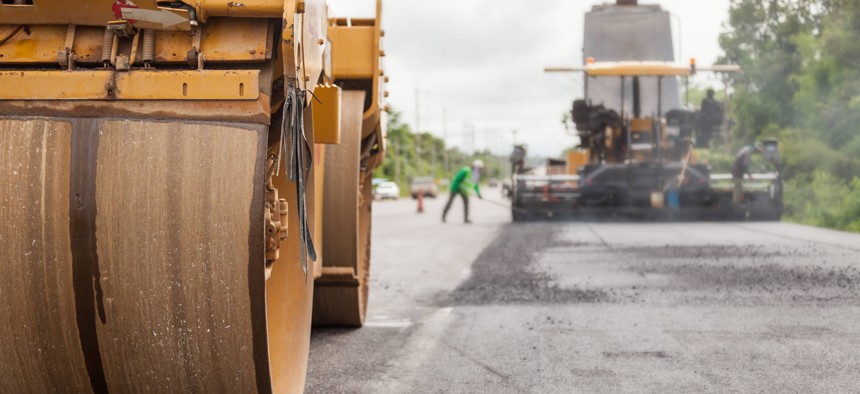It’s Been a Good Election Year for Transportation Funding

Road construction works with roller compactor machine and asphalt finisher. Pramote Polyamate via Getty Images
Nationwide, voters approved most of the proposals on the ballot to fund roads and transit, unlocking billions in new revenue for projects.
Transit advocates scored a big victory in suburban Detroit Tuesday, when Oakland County, Michigan voters approved a plan to raise property taxes and institute countywide bus service for the first time.
It was one of many victories that transportation groups hailed after this week’s election, when the vast majority of ballot questions to fund roads and transit sailed to victory.
Across the country, 14 out of 19 measures to back public transit passed. More broadly, voters approved 88% of state and local proposals to boost or maintain spending on roads and other transportation infrastructure, according to the American Road & Transportation Builders Association. Those 380 approved ballot questions will generate $19.6 billion in revenue in 18 states, the group said.
“A key takeaway from the results is that voters remain committed to investing their tax dollars in better streets, roads, bridges and transit systems even in the face of record inflation and high gasoline prices that are straining household budgets,” said Carolyn Kramer Simons, the director of the group’s Transportation Investment Advocacy Center.
Texas approved the largest share of new money of any state, according to ARTBA. Most of the $12.9 billion its voters approved support special units of government that build roads and other infrastructure in new housing developments.
Ohio saw the greatest number of transportation measures pass, with residents approving 94% of the 122 before them. The proposals will raise about $250 million, almost all of which is funded by property taxes and devoted to road improvements.
In the Detroit suburbs, Dave Woodward, a Democrat who chairs the Oakland County Board of Commissioners, hailed the passage of the transit measure there. Woodward helped put the measure on the ballot.
“Oakland County voters believe in making transit better everywhere and for everyone! After this vote, we finally move the conversation away from who needs or deserves access to transit, to how we make it work better for everyone, especially to help our most vulnerable neighbors,” he wrote on Twitter.
The other big suburban counties in the area – Macomb and Wayne – also approved property tax support for bus service.
Elsewhere, San Francisco voters extended a sales tax for bus service by 30 years and gave the local transit agency more flexibility in how it spends its revenue. In Virginia, Arlington County voters gave the OK for more than $52 million in bonds, most of which will support the Metro transit system that serves the Washington, D.C. region. Several counties in Colorado also backed transit measures.
But a handful of proposals went down in defeat.
In the Orlando, Florida area, a countywide measure to raise the sales tax by a penny per dollar was soundly defeated.
Orange County Mayor Jerry Demings and Orlando Mayor Buddy Dyer backed the proposal as a way to transform the transportation systems that serve the tourist mecca. The county’s plans called for adding transit, upgrading roads and spurring the construction of affordable housing.
But the question came before voters at a time when the Florida electorate saw a rightward shift.
“You can array the best political alliances, the chambers of commerce, unions, the whole nine yards, but at the end of the day, when you’re trying to raise taxes in a recession, you’re going up against a headwind,” Brian Henley, the head of the group Ax the Tax, told the Orlando Sentinel. “Voters are anxious about their money.”
Other transit-related measures failed in Florida’s Tampa area; Wilmington, North Carolina; and in the Central Valley region of California.
Still, Josh Cohen, the executive director of the American Public Transportation Association’s Center for Transportation Excellence, said the overall direction was encouraging.
“For years, the public’s support for transit has been on a roll, and 2022 is no different,” he said. “Voters support transit at the ballot box because it can transform a community and create pathways to a more equitable and accessible future. … While some of the larger measures suffered a setback, the results from the 2022 elections reflect a years-long trend toward greater investment.”
Separately, Denver voters appear to be on track to approve a measure to tax property owners to better maintain and expand the city’s sidewalk network, with 53% of the electorate supporting it, but the tally is still incomplete.
Daniel C. Vock is a senior reporter for Route Fifty based in Washington, D.C.
NEXT STORY: How the FCC shields cellphone companies from safety concerns






